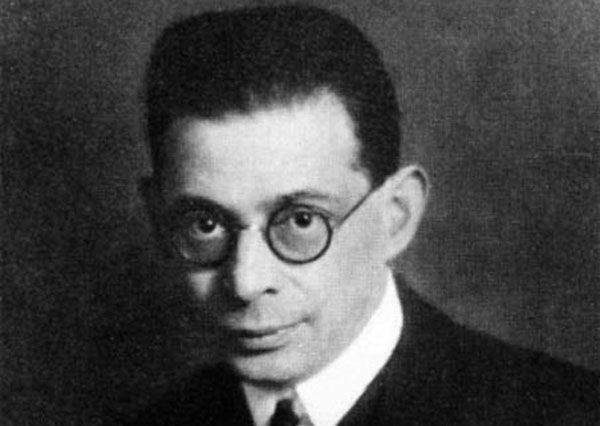Biography of Otto Rank (1884-1939)

- 1852
- 468
- Charles Fay
Austrian psychotherapist Otto Rank (1884-1939), Freud's disciple, taught and practiced a psychotherapy style based on his own Birth Trauma Theory.
"Famous phrases of Otto Rank"
Biography of Otto Rank
Otto Rank was born in Vienna on April 22, 1884, within a low middle class Jewish family with relational problems. It is said that his father was an alcoholic and did not deal with his family. As a child, Otto found comfort, among other things, in Richard Wagner's music. As he had enough intellectual interests, in his youth he read great authors such as Henrik Ibsen, Arthur Schopenhauer and Friedrich Nietzsche. Later he discovered the first works of Sigmund Freud, which for him were revelation.
When Rank was 21 he met Freud, who persuaded him to attend the University of Vienna and study psychoanalysis.
Otto Rank was One of Sigmund Freud's first disciples And he was part of his most confidence collaborators. They worked together for years to expand psychoanalytic theories. Rank was co -founder of the International Psychoanalytic Association in 1910. Also It was a prolific psychoanalytic writer, only overflowed with Freud. He was secretary of the Vienna Psychoanalytic Association and in 1919 he founded the International Editorial in Psychoanalytischen Verlag (International Psychoanalytic Editorial), an institution that directed until 1924.
His Thesis on birth anguish exposed in his main work Traum (Traum. Rank held that All anxiety, and therefore neurosis, occurred as a result of the baby's first trauma when separating from the mother. At first, Freud was impressed by this new idea of his favorite disciple, but then he was considerably distanced.
This is how Rank's theories began to get away from Freud's. Rank used the term psychotherapy instead of psychoanalysis Freud, and focused on elections, responsibilities, conscious and present experiences, instead of motivations, determinism, unconscious and the past.
In 1926 Rank finally cut its relationship with Freud and went to live the United States where it was established as Psychotherapist in New York. He founded the school Casework, that proposed a limitation of the time in which a therapy process should have elapsed.
Contribution to psychology
As we have already said, Rank was a prolific writer, publishing numerous books dedicated to psychology, creativity and dream analysis. He believed that therapy was a learning process, and that customers could unlearn misfit with the help of an adequate guide.
Rank is recognized for its influence on client -centered therapy And his conferences hit the work of many other great psychologists of the time, including Carl Rogers and Roll May.
Rank was one of the first psychotherapists to try therapies with psychodrama, and argued in his book Will Therapy that the emotional life of each person exists in the present tense, a phenomenon that he called here and now.
Other significant contributions from Otto Rank include:
- Type Short -term therapy with his clients, and looking for a more equal relationship in therapy that Freud had traditionally advised.
- Emphasize the role played by the early mother-child relationship in the subsequent development of life; Rank was one of the first psychologists to study attachment.
- Interpret and use in Psychoanalysis literature and mythology. In his book, The myth of the hero's birth, For example, Rank analyzes how myths, particularly on heroic figures, can serve as deposits of cultural norms and values.
- Use the Artistic creativity. Rank even used a person's creativity approach to analyze his personality, arguing that people to adapt learn to desire what they have been forced. Neurotic types have strong wills, but are distracted by the fight against domination by others. The productive types accept themselves and encourage creativity, Often becoming artists.
- Affirm that people have both life and death instincts. The instinct of life encourages people to become competent and independent individuals, while the death instinct pushes people to become members of a group or community.
Unlike Freud, Rank believed that emotion was a necessary element for treatment, both for the therapist and for the client. He firmly believed that the denial of emotions was much more harmful psychologically than simply experimenting them. Although Rank continued preaching and practicing its point of view of the Emotional therapy in the here and now, He had little support from the psychological community at that time. Rank's theories were not totally accepted until decades later.
Bibliography
- Rank, o. (1914). Birth trauma. Taurus.
- Rank, o. (1929). Art and artist. Paidós.
- Rank, o. (1932). The myth of the hero's birth. Editorial Alliance.
- May, r. (1953). Man's Search for Himself. W. W. Norton & Company.
- Ellenberger, h. F. (1970). The Discovery of the Unconscious: The History and Evolution of Dynamic Psychiatry. Basic Books.
- Mitchell, s. TO., & Black, M. J. (nineteen ninety five). Freud and Beyond: A History of Modern Psychoanalytic Thought. Basic Books.

